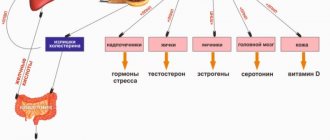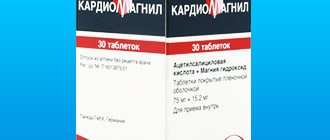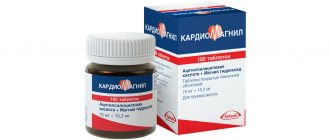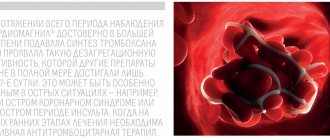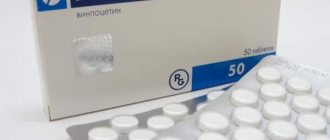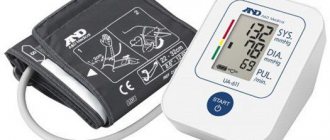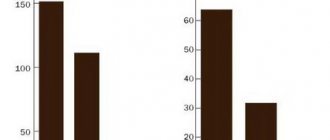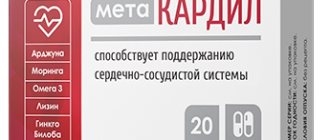For the treatment and prevention of heart and vascular diseases, a modern drug, Cardiomagnyl, was created based on acetylsalicylic acid.
The main purpose is to prevent thrombus formation and blockage of blood vessels with blood clots, to prevent heart attacks and strokes.
Cardiomagnyl: composition and price
When Cardiomagnyl enters the body, it has an anti-inflammatory effect. The drug does not contain hormones or narcotic substances, so you can purchase the medicine at your nearest pharmacy. You don't need a doctor's prescription for this.
The composition of the drug includes:
- acetylsalicylic acid, a blood thinner;
- magnesium hydroxide protects the intestines and stomach from the negative effects of the previous component.
The medicine also contains potato and corn starch, magnesium stearate, talc and fine cellulose. These substances complement the positive effects of the main components.
Helpful information
The price of Cardiomagnyl depends on the percentage of the main components:
- There are tablets in the shape of hearts. They contain 75 mg of aspirin and 15.2 mg of magnesium hydroxide. One package contains 30 tablets. Cost – up to 150 rubles. If you purchase 100 tablets, the cost of the package is up to 250 rubles.
- There are oval shaped tablets. They contain 150 mg of aspirin and 30.4 mg of magnesium hydroxide. For a package of 100 tablets you need to pay about 350 rubles.
The drug is sold in dark glass jars. The covers are made of plastic. This packaging allows you to protect the tablets from the adverse effects of the sun's rays.
Hearts and traditional look
Types and composition
The drug is presented in pharmacies in two types of tablets:
- heart-shaped with 75 mg of the main substance;
- oval shaped with a notch for ease of dividing into two parts with a dosage of 150 mg.
Each piece is covered with a film shell and contains acetylsalicylic acid as an active ingredient, as well as magnesium hydroxide.
Additional elements are represented by corn starch, talc, cellulose, magnesium stearate, propylene glycol, potato starch.
Cardiomagnyl tablets are packaged in tinted glass jars with a label of 30 or 100 pieces. Manufacturer: Nicomed, Denmark.
What is Cardiomagnyl used for?
This drug is prescribed if it is necessary to prevent the development of diseases caused by blockage of blood vessels. This often occurs after an acute myocardial infarction or to prevent it if symptoms are present.
Cardiomagnyl can also be prescribed in other cases:
- unstable angina;
- prevention of recurrent myocardial infarction;
- preventing the formation of thrombosis;
- high blood cholesterol levels;
- obesity treatment;
- to normalize well-being in diabetes mellitus;
- after bypass surgery to prevent thromboembolism;
- predisposition to heart disease;
- bad habits, in particular smoking;
- cardiac ischemia;
- atherosclerosis.
All the indicators described above provoke the development of pathologies of the heart and blood vessels. If you have at least one of them, you should notify your doctor. This will allow you to determine the optimal dosage of the drug to avoid side effects.
Doctors often prescribe Cardiomagnyl to patients over 60 years of age . They often have high blood pressure, as well as a predisposition to heart and vascular diseases.
Features of drugs and their differences
Cardiomagnyl and Magnikor are medicines with identical composition and properties.
From the above it is clear that Magnicor and Cardiomagnyl are analogues of each other. They have absolutely identical composition and action. They are prescribed for the same diseases. According to experts, there is no difference in the effect on the body.
The drugs differ only in name and manufacturer. The manufacturer of Magnikor is the Ukrainian pharmacological company. Cardiomagnyl is produced by one of the world's largest pharmaceutical companies - Takeda.
If we talk about cost, Cardiomagnyl costs about 20% more. However, patients who took both drugs noted a milder effect of Cardiomagnyl on the gastric mucosa. Magnicor often provokes exacerbation of gastritis and gastric ulcer. The features of taking the drugs, their effects and contraindications are identical.
To reduce the risk of side effects when taking aspirin-based drugs, you need to remember some nuances:
- If there is a high risk of developing myocardial infarction due to blood clots, a drug with acetylsalicylic acid can be prescribed even for gastric bleeding and bronchial asthma. However, in this case, treatment should be carried out under the supervision of a doctor, preferably in a hospital. Strict adherence to dosage is important.
- When taking heparin and acetylsalicylic acid at the same time, the effect of the first drug is enhanced.
- If surgery is planned, medications with aspirin are discontinued several days before the scheduled procedure. This is necessary to reduce the risk of bleeding during surgery. However, in case of serious heart disease, when taking acetylsalicylic acid is necessary, you need to weigh all the risks and dangers.
- Preparations containing acetylsalicylic acid are not recommended to be taken simultaneously with alcohol. Alcohol enhances the negative effect of aspirin on the gastric mucosa and provokes the appearance of hemorrhages on it.
The attending physician should control the choice of drug and dosage. As a rule, experts do not distinguish between drugs and allow the voluntary choice of Cardiomagnyl or Magnicor. Many patients opt for a cheaper analogue.
Benefits of taking Cardiomagnyl
Having studied the information about Cardiomagnyl, we can highlight the following benefits for the body:
- Auxiliary effect. Thanks to this, blood clots will not form after surgery.
- Strengthening the body, preventing repeated thrombosis and myocardial infarction. After an illness, doctors prescribe a certain list of medications for therapy. Domestic Cardiomagnyl has a budget price compared to foreign analogues. Therefore, most people believe that Cardiomagnyl is better, since it has a golden mean - price/quality.
- Prevention of arterial hypertension, diabetes mellitus and hyperlipidemia.
How to drink Cardiomagnyl?
- Doctors often prescribe a dosage of 75 mg per day. If the patient suffers from varicose veins or thromboembolism, the prescribed dosage is maintained. If unstable angina was diagnosed during the examination, you need to take 75 or 150 mg per day . In case of chronic cardiac ischemia, it is advisable to take 150 mg of Cardiomagnyl per day.
- There is an opinion that you need to take Cardiomagnyl in the evening to speed up falling asleep. That is why the tablets should be taken after dinner. Especially if you suffer from hypertension. However, it is important to understand that eating heavy meals will slow down the absorption of the drug. This is why many doctors advise taking pills in the morning.
- Many patients are interested in when to take Cardiomagnyl: before or after meals. The instructions do not provide clear recommendations. You must start from your own feelings. Considering that medications in this group can negatively affect the gastrointestinal tract, it is better to take the tablets after meals.
- If you cannot swallow the tablet completely, you can break or chew it. Afterwards, take the drug with 100 ml of water. You can also turn the tablet into powder by thoroughly crushing it. Then dissolve the powder in 1 tbsp. l. warm water.
You can drink it for treatment and prevention
What is better to use: Magnicor or Cardiomagnyl
In order to determine the positive aspects and disadvantages of Cardiomagnyl and Magnicor, it is necessary to carry out their comparative characteristics, on the basis of which the following conclusions can be drawn:
- Cardiomagnil differs from Magnicor in the concentration of the main active substance - acetylsalicylic acid. In Cardiomagnyl, 1 tablet contains 150 mg of this substance, so patients have to take half a tablet. The composition of Magnicor is 75 mg of the active component, so taking the medicine in this form is more convenient. This is evidenced by numerous patient reviews.
- In addition to the blood thinner, Cardiomagnyl contains magnesium hydroxide, which reacts chemically with hydrochloric acid in gastric juice and reduces its concentration. This has a beneficial effect on the mucous membrane of the digestive tract, since acetylsalicylic acid can increase acidity. Magnicor does not have such properties, so after taking it the patient may have a stomach ache.
- Magnicor is covered with an additional layer of food coating, which allows the tablet to pass through the stomach and begin to dissolve only in the small intestine. This is a positive property of Magnikor, which Cardiomagnyl does not have.
Based on this, we can conclude that Magnicor and Cardiomagnyl can be used in the therapeutic process, since in fact they are analogues of each other and differ insignificantly. The price for Magnicor and Cardiomagnyl is in the range of 75-80 rubles per pack of tablets.
Taking Magnicor and Cardiomagnil at the same time is contraindicated, as an overdose of acetylsalicylic acid will occur. A qualified attending physician will never prescribe a patient to take Magnicor together with Cardiomagnyl.
Cardiomagnyl: how much to take?
- It is impossible to say exactly how long you will have to take Cardiomagnyl. It all depends on the individual characteristics of the body (the presence or absence of excess weight, age, etc.). If the condition is stable, it is enough to take the tablets for only 30 days. In case of high blood pressure, the course of treatment is 2-3 months.
- However, there is a recommendation regarding the maximum duration of admission. You should not drink Cardiomagnyl for more than 5-6 months . Some doctors advise taking short breaks during therapy. Take the pills for a month, and then take a break for 14-21 days.
How to take Cardiomagnyl to prevent diseases?
- To prevent primary or repeated thrombosis, you need to take 150 mg of Cardiomagnyl per day. If the risk of complications decreases, reduce the dosage by half.
- To prevent acute heart failure, take 150 mg of the medicine on the first day, and then only 75 mg daily. The same dosages are relevant for the prevention of recurrent heart attack and thromboembolism.
- For people suffering from obesity, you can increase the daily dosage to 200 mg.
Taking Cardiomagnyl during pregnancy and lactation?
- During pregnancy, you can take Cardiomagnyl, however, you should not exceed 150 mg per day. If you take more than 500 mg daily, the risk to the fetus increases.
- It is not recommended to take Cardiomagnyl in the first trimester, as this may cause the development of fetal defects. In the second trimester, the medicine can be taken only in case of strict indications. The doctor must first examine the tests so as not to harm the unborn child.
- In the third trimester you should not take Cardiomagnyl. It can reduce labor and provoke internal bleeding.
- During lactation it is not recommended to drink Cardiomagnyl. Doctors often advise stopping breastfeeding for the entire duration of therapy.
Composition, properties and purpose of Cardiomagnyl
Cardiomagnyl is used for the treatment and prevention of cardiovascular diseases
The drug Cardiomagnyl contains acetylsalicylic acid and magnesium hydroxide. Acetylsalicylic acid prevents the formation of blood clots, and magnesium hydroxide protects the stomach from its aggressive effects.
The drug is available in tablet form in dosages of 75 and 150 mg. The drug is recommended for people with cardiovascular diseases, with a high risk of thrombosis, atherosclerosis, during and after heart attacks. Risk groups for whom Cardiomagnyl treatment is often recommended include overweight people, heavy smokers, people with a hereditary predisposition to cardiovascular diseases, and people with high blood cholesterol.
The drug has a number of properties:
- Painkiller. The analgesic effect is achieved by influencing the brain centers responsible for the perception of pain.
- Anti-inflammatory. Aspirin relieves inflammation by inhibiting enzymes that are responsible for inflammatory mediators. As a result, the inflammatory process subsides quite quickly.
- Antipyretic. Acetylsalicylic acid has an antipyretic effect, but the drug is used infrequently in this role, since there are milder and more gentle antipyretic drugs.
- Antiplatelet. Acetylsalicylic acid reduces the ability of platelets to stick together, reducing the likelihood of blood clot formation. However, in case of bleeding, this can play a negative role.
All this concerns the action of aspirin, which is included in the composition. Magnesium hydroxide is designed to reduce stomach acid levels, which helps reduce the aggressive effects of acid on the stomach walls.
Cardiomagnyl is often prescribed for prevention purposes.
An increased amount of cholesterol or platelets in the blood is often detected by chance during routine tests. If the disease is in its early stages, it is easier to prevent it, so drugs based on acetylsalicylic acid are prescribed in small dosages to reduce the risk of complications.
The drug is also often prescribed after a myocardial infarction to prevent relapse, as well as to prevent thromboembolism after vascular surgery.
Rules of use and contraindications
Tablets are taken orally, regardless of food intake.
It is recommended to swallow the tablet whole with water. However, if necessary, it can be chewed or broken. Usually the drug is taken 1-2 times a day, 75 or 150 mg per day, depending on the severity of the patient’s condition and the characteristics of the course of the disease.
For prevention, 75 mg is enough. The drug should be used with caution with other drugs. For example, Ibuprofen reduces its effect when taken simultaneously.
If the dosage is exceeded, the following side effects may occur:
- Dizziness and migraine. These signs do not appear as often, but may also be accompanied by tinnitus and hearing loss.
- Nausea and vomiting. This may be due to the negative effects of aspirin on the gastric mucosa.
- Hyperthermia. Despite the antipyretic properties of aspirin, in case of an overdose and signs of intoxication appear, the temperature may rise.
- Allergic reaction. It is expressed in skin rashes: pimples, rash, itching, hives. Allergic rhinitis is also possible.
- Liver disorders. Liver test levels may change. Manifestations of acute hepatitis are rare when the prescribed dose of the drug is exceeded many times.
- Heartburn. The effect of acid on the walls of the stomach can cause reflux and severe heartburn and nausea.
Do not forget that blood thinners can lead to bleeding. People with increased bleeding due to this background may develop anemia.
Acetylsalicylic acid affects the development of the fetus and increases the risk of abnormalities, therefore the drug is not recommended during pregnancy.
It is especially undesirable to take it in the 3rd trimester, since during childbirth severe bleeding may begin, threatening the woman’s life.
Cardiomagnyl is also not prescribed during breastfeeding, as it can have a negative effect on the baby. Possible use when breastfeeding is interrupted.
Like any drug containing acetylsalicylic acid, Cardiomagnyl is contraindicated for people with stomach ulcers. Also, in people with gastritis, the drug can cause ulcers, so caution should be exercised.
Cardiomagnyl: contraindications, overdose and side effects
Like all medications, Cardiomagnyl has a number of contraindications.
It is not recommended to take the medicine in the following cases:
- hemorrhagic diathesis;
- thrombocytopenia;
- lack of vitamin K;
- individual intolerance to the components included in the composition;
- aspirin asthma, which occurs after taking acetylsalicylic acid;
- erosion or stomach ulcer;
- bleeding in the gastrointestinal tract;
- liver problems;
- age up to 18 years.
For patients diagnosed with gout, allergies or nasal polyps, Cardiomagnyl is prescribed with caution. The medicine may worsen the course of the disease.
Quite often, taking Cardiomagnyl provokes allergies.
It may be accompanied by the following symptoms:
- nasal congestion;
- rashes;
- itching on the skin;
- blisters.
In rare cases, the drug can provoke bronchospasm and angioedema.
You can also note a number of other side effects, including:
- diarrhea, vomiting, ulcerative colitis, epigastric pain and hepatitis;
- nosebleeds and agranulocytosis;
- headaches, drowsiness and cerebral hemorrhage;
- profuse sweating and swelling;
- tinnitus and loss of coordination.
Patients over 60 years of age should carefully monitor the daily dosage of the drug. There is a risk of losing vision. If the side effects are of moderate intensity, it is enough for the patient to drink activated charcoal. If intoxication is severe, you should immediately call an ambulance.
Composition, properties and indications for use of Magnikor
Magnicor belongs to the group of antithrombic agents
A huge number of people die due to blood clots. Treatment of cardiovascular diseases is an important aspect of medicine. New drugs are constantly appearing, but at the moment the most effective blood thinner remains acetylsalicylic acid. It is part of both drugs and determines their basic properties.
If we talk about what to choose: Magnicor or Cardiomagnyl, which is better and more effective, then experts agree that the general effect of the drugs is identical. The selection of the drug is carried out individually.
Magnicor not only reduces the likelihood of blood clots, it has an anti-inflammatory and analgesic effect. Aspirin in the composition also relieves fever. In addition to acetylsalicylic acid, the composition includes magnesium hydroxide. It performs a protective function, reduces the acidity of gastric juice, protects the walls of the stomach from the aggressive effects of aspirin.
Magnicor is prescribed in the following cases:
- Unstable angina. This disease often leads to myocardial infarction. Angina pectoris is accompanied by heart pain and circulatory disorders. A patient with angina pectoris must be hospitalized and observed, since it is impossible to predict the course of the disease.
- Myocardial infarction. A life-threatening condition that is accompanied by a disruption of the blood supply to part of the myocardium. The heart muscle begins to die, the heart cannot cope with its functions. Heart attacks vary in extent and can lead to death and chronic heart failure.
- Increased thrombus formation. Magnicor is prescribed if examination reveals a tendency to thrombosis. The drug is taken for prevention.
- Increased cholesterol levels. This is the main cause of atherosclerosis. To avoid the accumulation of cholesterol on the walls of blood vessels, preparations based on acetylsalicylic acid are recommended.
- Obesity. People who are overweight and have impaired metabolism are more prone to thrombosis and atherosclerosis.
Before using the drug, you should definitely consult your doctor. Uncontrolled use of Magnicor can cause bleeding and other complications.
Rules for use and contraindications to the drug
The course of treatment and dosage depends on the indication and severity of the disease
Your doctor will tell you how to take Magnicor. The drug is prescribed in courses. The therapeutic dose is 150 mg per day. For severe angina, the dose may be increased to 450 mg per day. The drug is available in tablet form in various dosages. The tablet is swallowed whole, without chewing, with a sufficient amount of water.
Before using the drug, you need to go for examination. The dosage and duration of treatment depend on the diagnosis. In case of acute myocardial infarction, it is recommended to take the drug starting from the first symptoms. If prevention of cardiovascular diseases is carried out, but there are no serious pathologies, the dosage is reduced to 75 mg per day.
Contraindications to the use of the drug are:
- Individual intolerance. Some people are intolerant to aspirin. In this case, it comes to selecting another drug.
- Stomach ulcer. Acetylsalicylic acid is quite aggressive towards the walls of the stomach. Magnicor is contraindicated for people with ulcers.
- Increased risk of bleeding. People with low platelet levels and vitamin K deficiency should not take medications with acetylsalicylic acid, as the risk of bleeding increases.
- Asthma. People with bronchial asthma should not take aspirin, since the symptoms of asthma are aggravated by taking non-steroidal anti-inflammatory drugs.
- Childhood. Magnicor is contraindicated for children, as there is a high risk of side effects.
- Pregnancy. Due to the high risk of bleeding during labor, the drug should not be taken in the third trimester of pregnancy.
- Heart failure. Although aspirin is sometimes prescribed to treat this disease, it is dangerous to take it in severe heart failure.
- Liver and kidney failure. The drug may have effects other than the liver and is excreted in the urine. In case of serious diseases of these organs, a sign of intoxication may occur.
The drug has a number of side effects, which are indicated in the instructions. The most dangerous thing is bleeding. There may also be headaches, sleep disturbances and digestive disorders.
Cardiomagnyl: analogues
- If the patient, for one reason or another, is not satisfied with Cardiomagnyl, the doctor may prescribe similar drugs. They are not complete analogues, since they do not contain magnesium hydroxide. Therefore, the gastrointestinal tract will not be protected from the negative effects of acetylsalicylic acid.
- Doctors often prescribe Acecardol or Thrombo-ASS. These medications are affordable. “Acecardol” costs 40 rubles, and “Trombo-ASS” costs 150 rubles. Also on the list of recommended drugs, instead of Cardiomagnyl, may be Aspirin Cardio. The tablets have a dissolvable coating, so they are absorbed more slowly.
It is acceptable to use analogues of the drug
. As you can see, Cardiomagnyl is the best option for those who need to prevent serious heart and vascular diseases. It is important that you stick to the daily dosage to avoid adverse effects. Remember not to self-medicate. Only the attending physician should prescribe the drug and daily dosage.
How does Cardiomagnyl work?
The mechanism of action is due to the combined composition. Acetylsalicylic acid has a negative effect on the gastrointestinal mucosa and can lead to peptic ulcers or provoke a relapse of an existing disease. Magnesium hydroxide is a hydrochloric acid neutralizer, added to protect the stomach lining from the aggressive effects of aspirin.
Acetylsalicylic acid is a non-steroidal anti-inflammatory drug that has analgesic and antipyretic effects. The dosage of the substance in Cardiomagnyl allows:
- reduce blood clotting;
- prevent platelet clumping;
- prevents the formation of blood clots in large vessels.
Taking Cardiomagnyl: reviews
- Galina, 24 years old: When I was undergoing a medical examination for work, the cardiologist asked a lot of questions. After studying my medical record, it turned out that I have a predisposition to heart disease. In addition, I have a bad habit – smoking. To avoid negative consequences, the doctor prescribed Cardiomagnyl for me. Daily dosage – 75 mg. Just after a week of taking the medicine, my shortness of breath disappeared and I feel much better.
- Anastasia, 71 years old: Last year I experienced a myocardial infarction. The first few months after treatment I felt good, however, after that I again felt discomfort in the heart area. The doctor prescribed Cardiomagnyl at a dosage of 75 mg per day. Just a few days later, the pain in my heart disappeared, and now I can’t imagine my day without this medicine.
- Anna, 27 years old: At the age of 24, I was diagnosed with suspected coronary heart disease. To avoid adverse consequences, the cardiologist prescribed Cardiomagnyl. I have been taking this drug for three years, following all the doctor’s recommendations. Fortunately, nothing bad happened during this time.
We will also talk about the use of such drugs:
- Suppositories for constipation during pregnancy
- Patches and transdermal therapeutic systems
- Fluditek for children
- Chromium
- Essentiale N
